BY PHYLLIS ECKHAUS | Chanting “Save Our Community Hospital!” activists with the Campaign to Save Beth Israel and New York Eye and Ear Infirmary braved drizzle and blustery wind on Saturday as they held a “victory march” from Abe Lebewohl Triangle at E. 10th Street, north to the two embattled East Village hospitals at E. 14th and E. 16th Streets.
Marchers celebrated startling recent wins against Mount Sinai Health System, the hospitals’ parent company, which is seeking to shutter Beth Israel by July, and dismantle NYEE.
The campaign coalition has made headway in its lawsuit to stop the closures. Following reports that Mount Sinai had continued to strip services from Beth Israel despite a “cease and desist” order from the New York State Department of Health, on March 27, State Supreme Court Justice Nicholas Moyne ordered Mount Sinai to restore services it had illegally closed and to negotiate the restoration of services at both facilities with D.O.H., local politicians, community leaders and lawsuit plaintiffs.
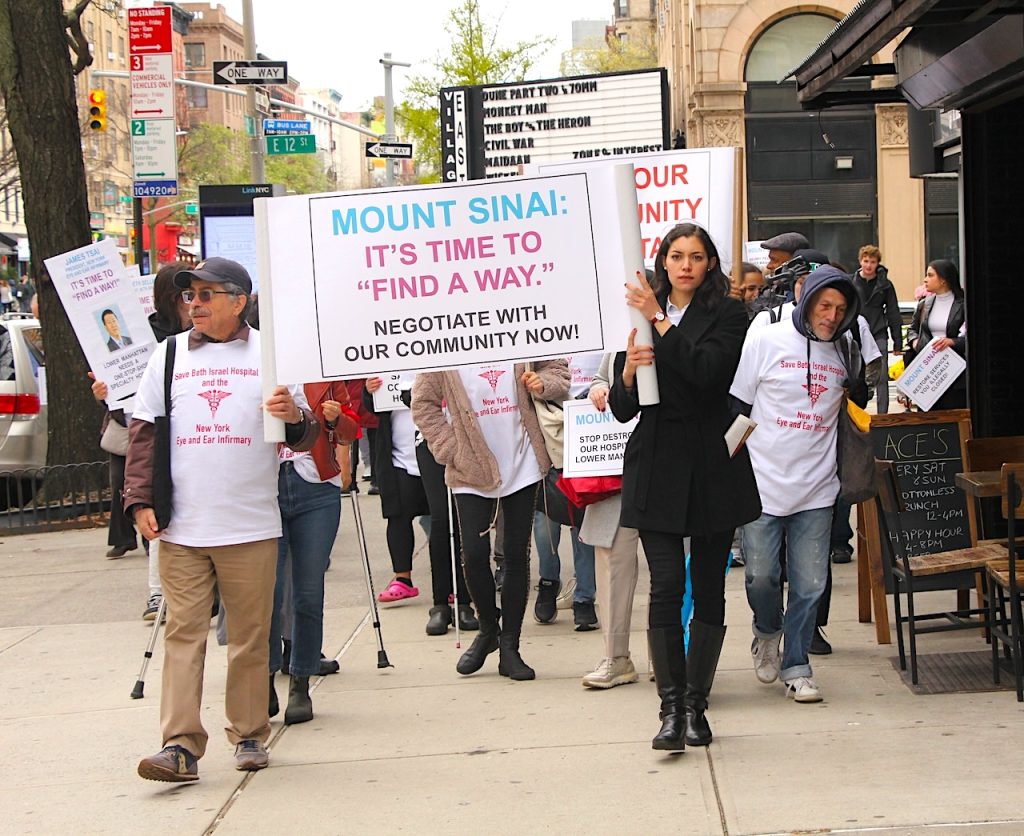
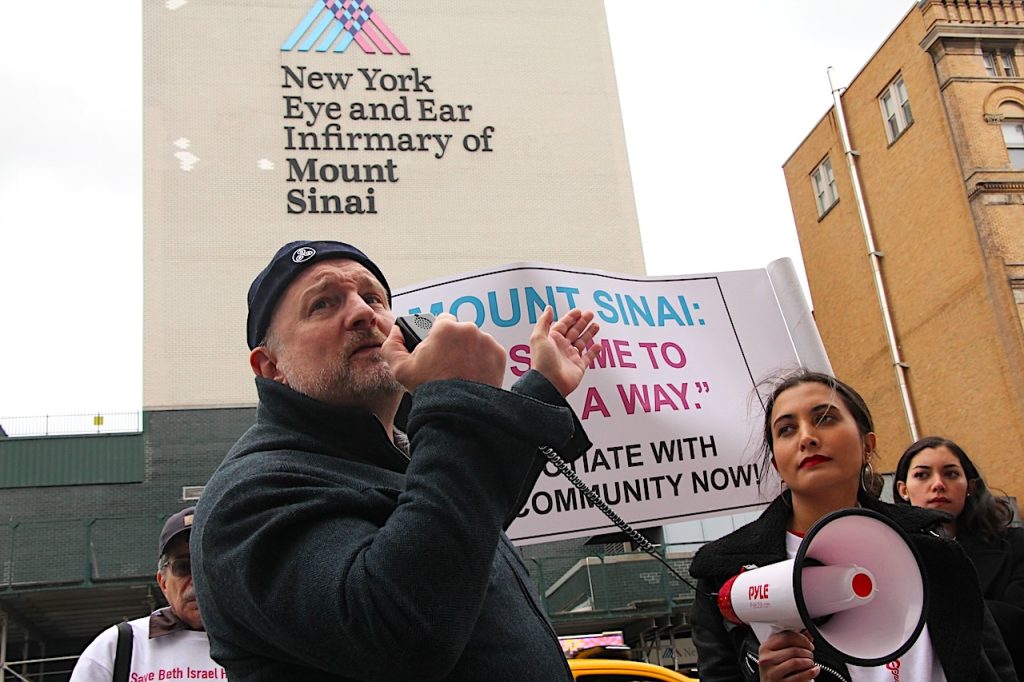
And on April 2, as The Village Sun reported, D.O.H. rejected Mount Sinai’s proposed closure plan for Beth Israel as “incomplete,” requiring the hospital behemoth not only to engage with local politicians and the community, but to provide audited financial statements to support its claim that financial losses have forced the closure.
Importantly, D.O.H. also mandated that Mount Sinai work with other hospitals to confirm the continued availability of emergency services and the capacity to respond to emergencies.
Mark Hannay, director of Metro New York Health for All and a facilitator of the campaign, characterized the battle to keep the hospitals open as “emblematic of what’s happening to our healthcare system, in this city, our state and across the nation, and not in a good way.”
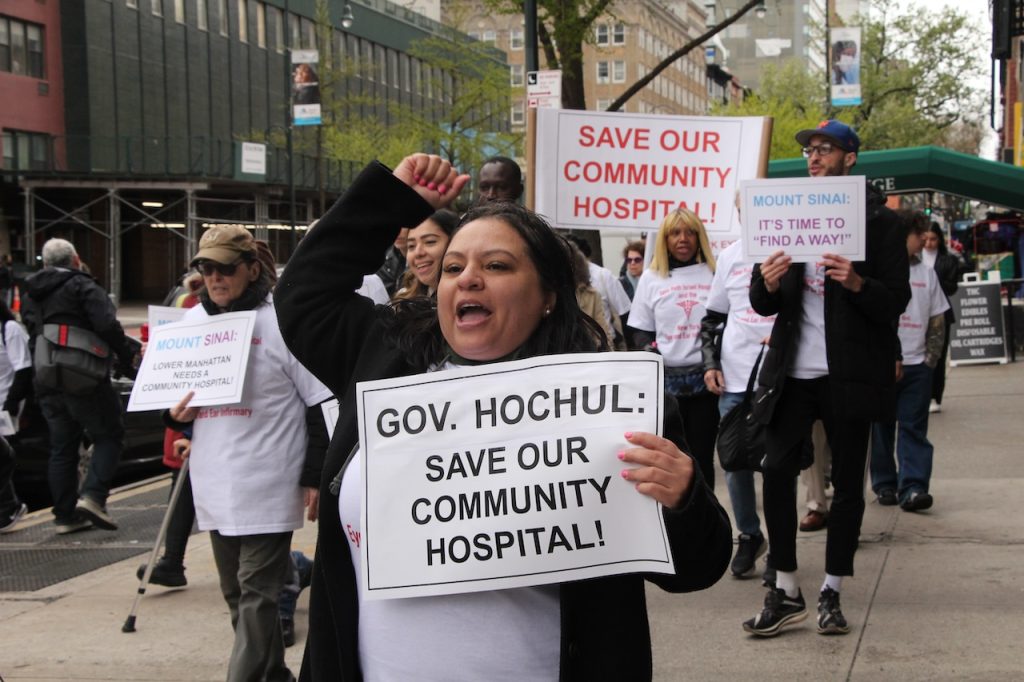
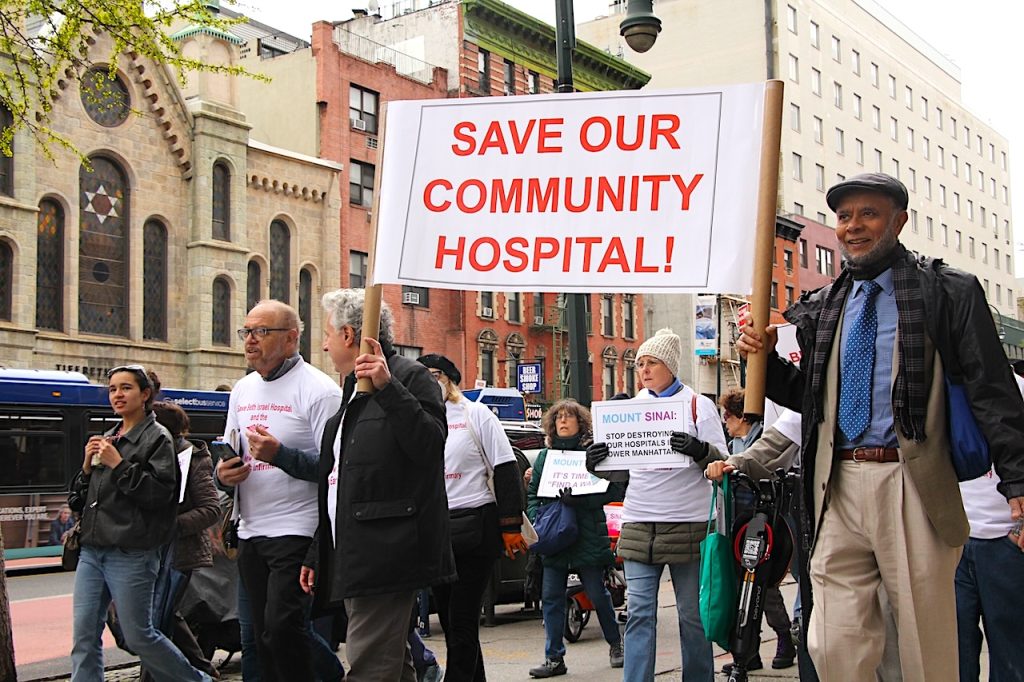
A Lower East Sider who has three times ended up in Beth Israel’s emergency room after bike accidents, Hannay observed the hospital closure would put him at personal risk.
“I’m no spring chicken anymore,” he said. “If something happened to me, where would I go?”
He condemned repeated broken promises to the community.
“In 2010, when St. Vincent’s [Hospital] closed, we were told by all the public officials that Beth Israel was going to be our community hospital, from Canal Street to 23rd Street, river to river,” he said. “And when Mount Sinai took over Beth Israel a little over a decade ago, they made the same promise.
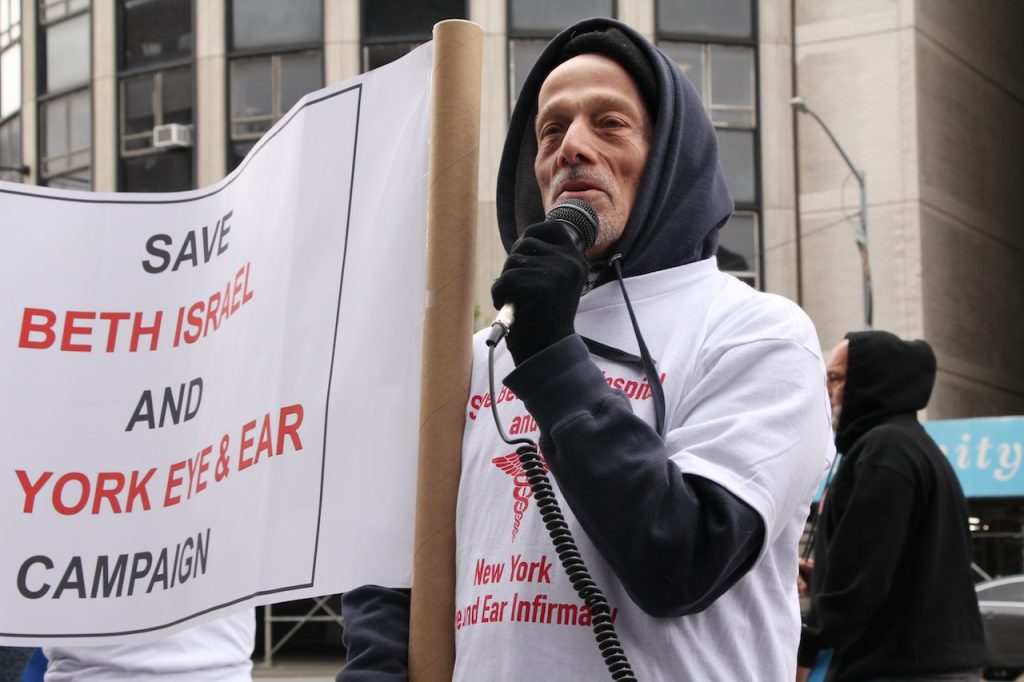
“[Yet] when Mount Sinai took over….right away they started moving the services to their Uptown hospitals. And two years later, in 2017, they announced that they were going to build a new, much smaller community hospital, a new Beth Israel Hospital next door to Eye and Ear.”
That plan to downsize Beth Israel from a 600-bed hospital to a 70-bed mini-hospital received state approval and was thwarted only by COVID, which demonstrated the community need for hospital beds.
Hannay expressed cautious optimism in the face of Mount Sinai’s apparent intransigence.
“We already have heard that Mount Sinai is going to file an appeal with the court,” he said. “And that they’re going ahead and still closing down services in defiance of the court order” — and also in defiance of the D.O.H. cease-and-desist order.
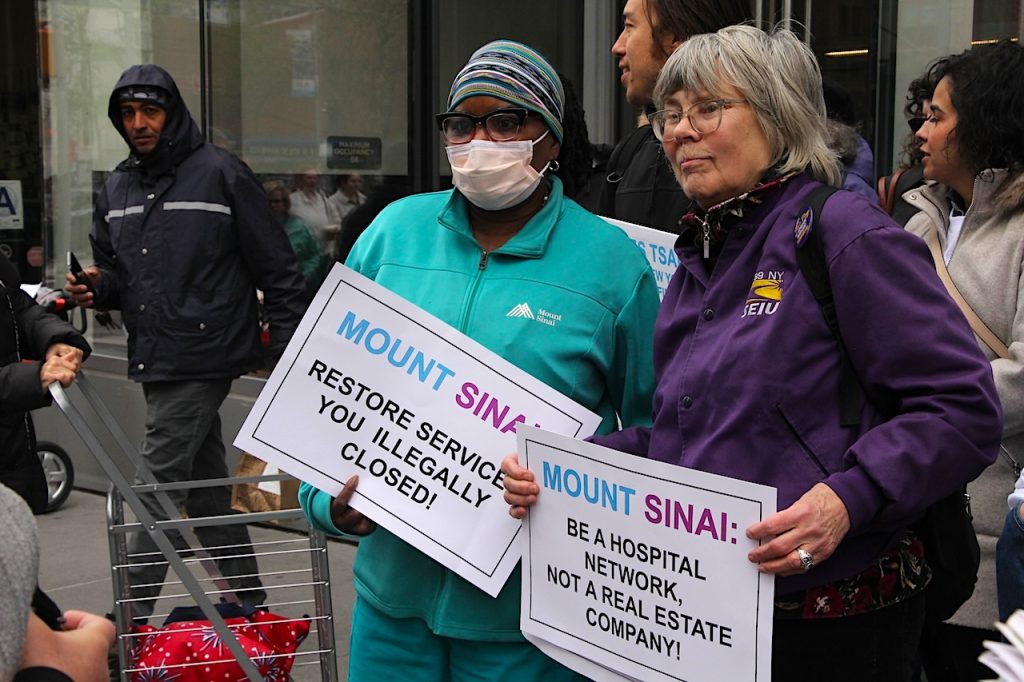
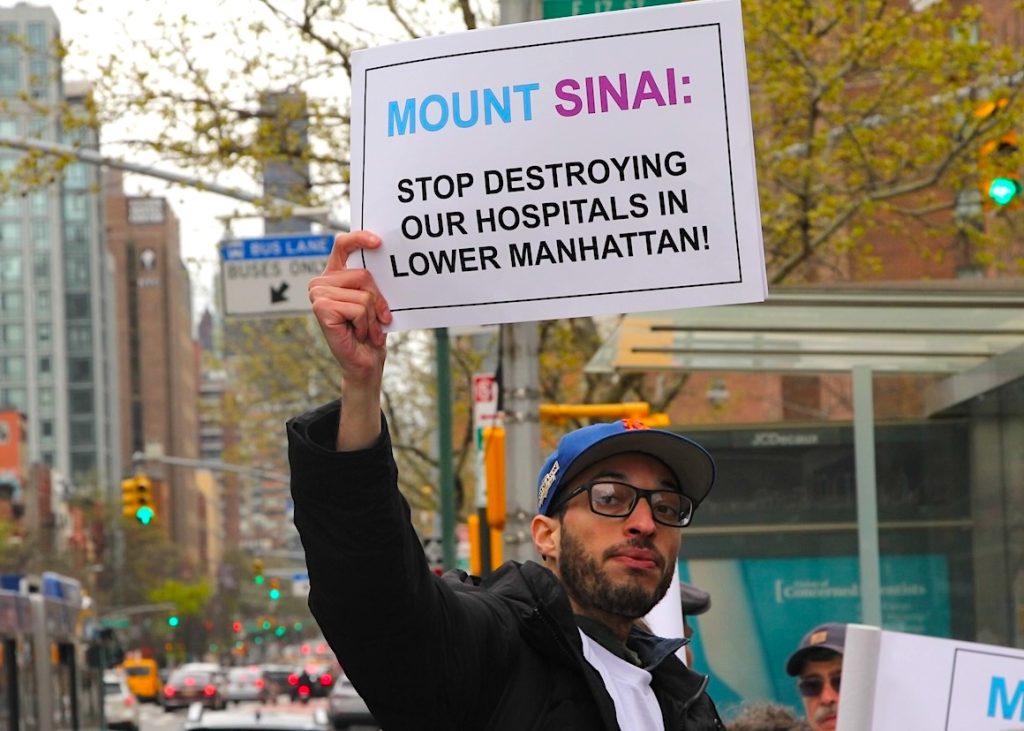
“We’ve got our work cut out for us but we’ve got some levers we can pull,” Hannay continued. “I’m confident in the end [there’ll be] some kind of hospital facility here in Lower Manhattan. We don’t know what it will look like. We don’t know who’s going to run it, whether it’s still going to be Mount Sinai or somebody else. But, nonetheless you know, we’re on a roll, we’ve got a bit of wind at our back, and we’re going to go forward.”
As the march paused in front of NYEE, oncologist and eye surgeon David Della Rocca, whose own father was a legendary eye doctor there, noted that NYEE, founded in 1820, was the first specialty hospital in the United States, advancing knowledge thanks both to its expertise and its robust relationship with the Lower East Side community.
NYEE pharmacist Antoinette Milito underscored the irreplaceable advantages of a centralized, one-stop, world-class specialty hospital for people with sensory disabilities — from easy transit access to the ability to see multiple doctors in one visit.
“Dividing services into separate parts will never equate to a whole,” she declared.
Specialty hospitals offer essential services, she noted, remarking that the special compounds she prepares for the NYEE pharmacy are not commercially available, and allow the prompt treatment of patients throughout the tri-state area whose vision is at risk.
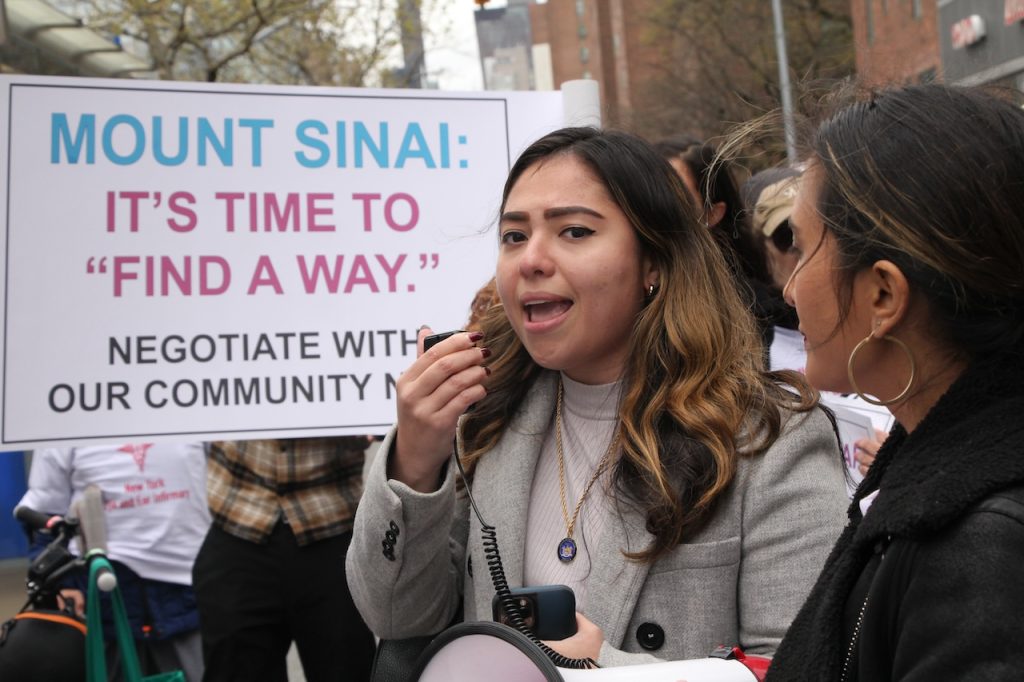
From a traffic island in front of Beth Israel, state Senator Kristen Gonzalez spoke urgently of the need to change the New York State hospital closure process.
“We’ve seen the community, the people most affected, are not at the table,” she said, adding that closures “consistently put profit over people, and that’s not right.”
Gonzalez, who has sponsored a bill to establish a moratorium on hospital closures, declared, “This is life and death for us. It’s about our elderly, our differently able folks. It’s about maternal health throughout our state.”
The Lower Manhattan organizing campaign, she said, “is making waves, is being heard in the highest places. It’s inspiring people in places in New York that you don’t even know.”
Health policy advocate Lois Uttley, co-founder of Community Voices for Health System Accountability, demanded that Mount Sinai be held to account. She detailed the “health-equity impact assessment” she conducted for the coalition, to determine what impact the closure of Beth Israel would have on medically underserved people in the community.
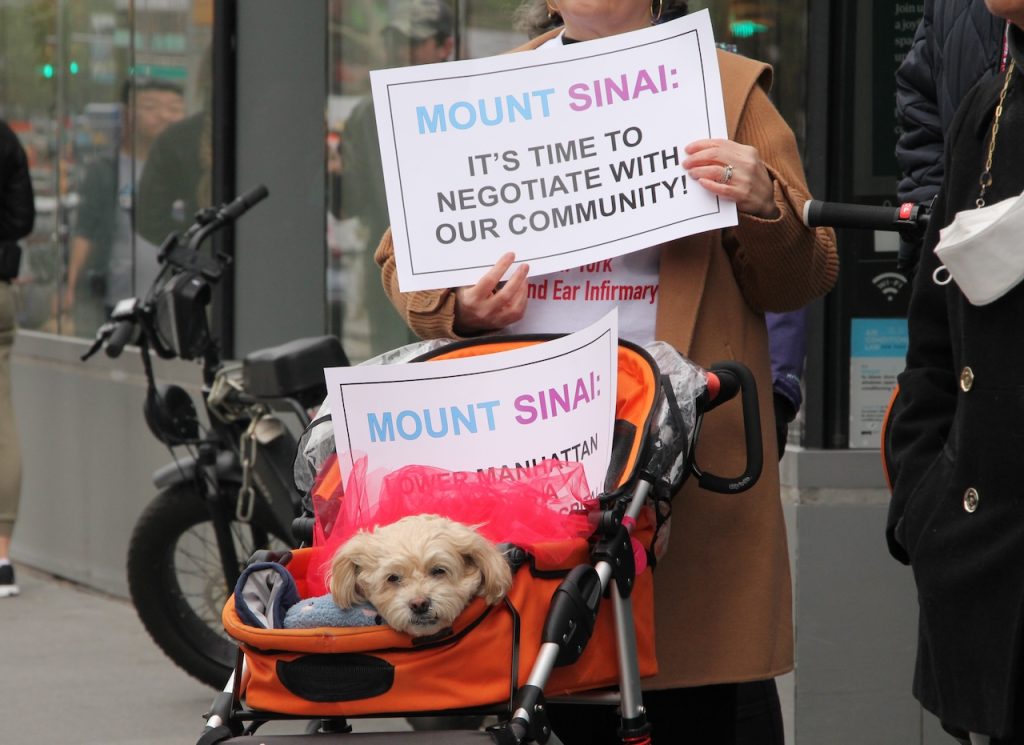
Among Uttley’s findings: “Closing Beth Israel would have an especially negative impact on people with disabilities and frail elderly people, for whom Beth Israel is the closest hospital — the place they have always been able to get to quickly in emergencies. Also harmed would be low-income, racially diverse residents in the two zip codes — 10002 and 10009 — from which the largest proportions of Beth Israel patients originate. They are unsure they would be welcomed at N.Y.U. [Langone Hospital] and have found that Bellevue’s ER is often very overcrowded.
“The two closest hospitals to Beth Israel — Bellevue and N.Y.U. Langone — each have emergency departments serving more than 60,000 patients a year, with average wait times of more than three hours,” Uttley added. “They’re not going to be able to absorb all the patients that usually go to the Beth Israel ER.”
Mike Schweinsberg, president of the 504 Democratic Club, said people like his club’s members — who have disabilities — need “close proximity to a full-blooded hospital…to avoid losing their independence and being institutionalized.” But the plan Mount Sinai put forward, he said, “leaves a medical desert. That’s like saying to disabled people, ‘Get out of here!’”
Schweinsberg characterized Mount Sinai’s leadership as corporate raiders, who, despite their nonprofit status, “got used to acting like vulture capitalists, swooping into profitable hospitals, stripping them of everything that was good.” Mount Sinai, he charged, “took out [from Beth Israel] half a dozen profitable units — cardiac surgery, labor and delivery, pediatric care and others — and left a decaying hulk, just like vulture capitalists do when they take over other businesses.”
Schweinsberg introduced Arthur Schwartz, the activist attorney whose Advocates for Justice law firm first filed suit to save Beth Israel in 2017. Schwartz scoffed at Mount Sinai’s claim that financial losses at Beth Israel compel its closure.
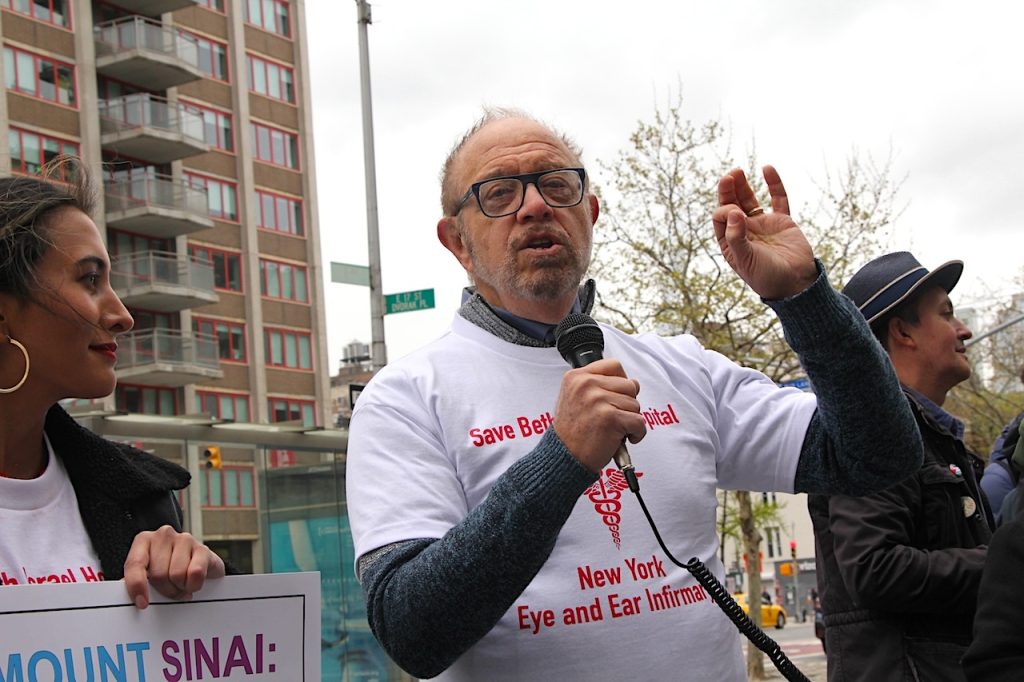
“Mount Sinai grosses $23 billion a year,” Schwartz said. “That’s one-quarter of the New York City budget, bigger than the gross national product of Jamaica. That is an enormous institution, and they’re yelling, ‘Oh, we lost $100 million at Beth Israel.’”
Schwartz contended that Mount Sinai engaged in creative accounting: “What they lost is depreciation… . They’re not losing money here.”
The attorney described how, after Beth Israel saved his life after his 2017 heart attack, a group of Beth Israel nurses became his continuing confidential informants about what’s happening there behind the scenes.
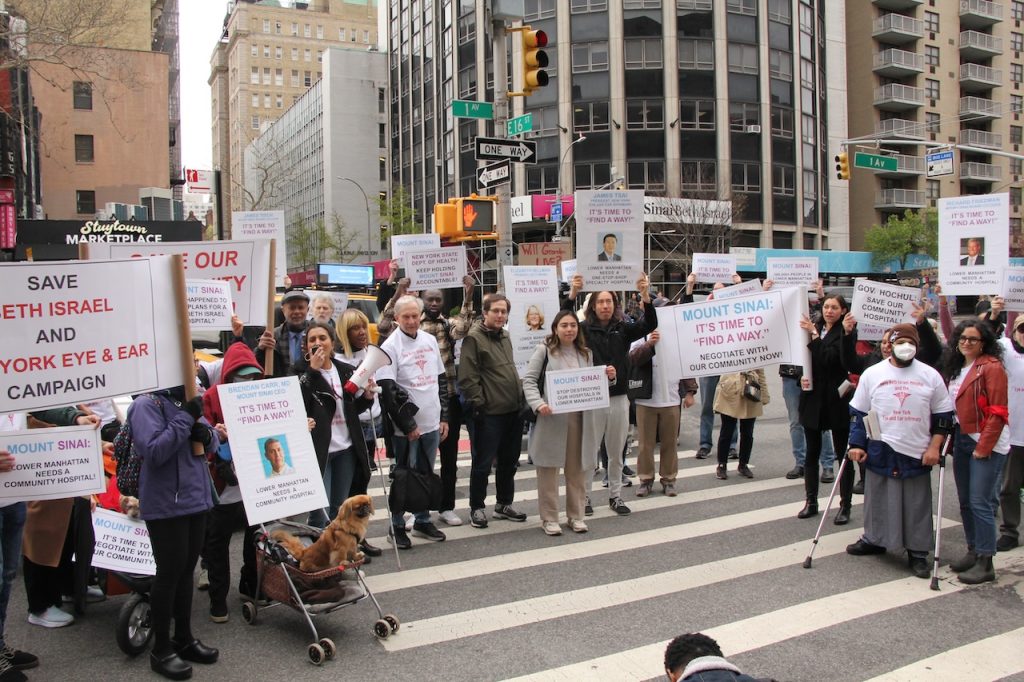
Of Beth Israel today, Schwartz said, “It’s empty. All the doctors left March 31st.”
He announced to the crowd that on April 12, the day before the march, “I asked the judge to convene a contempt hearing because [Mount Sinai] is not using their best efforts. They are continuing their arrogant, anti-legal effort to close.”
Schwartz mocked Mount Sinai’s claim that it is unable to hire staff, noting that the health system has failed to advertise specifically for temporary staff despite proclaiming Beth Israel will be closed by July.
“We have to keep our voices loud,” Schwartz asserted. “Twenty-three billion dollars a year — that makes you pretty arrogant, and they’re not going to stop.”

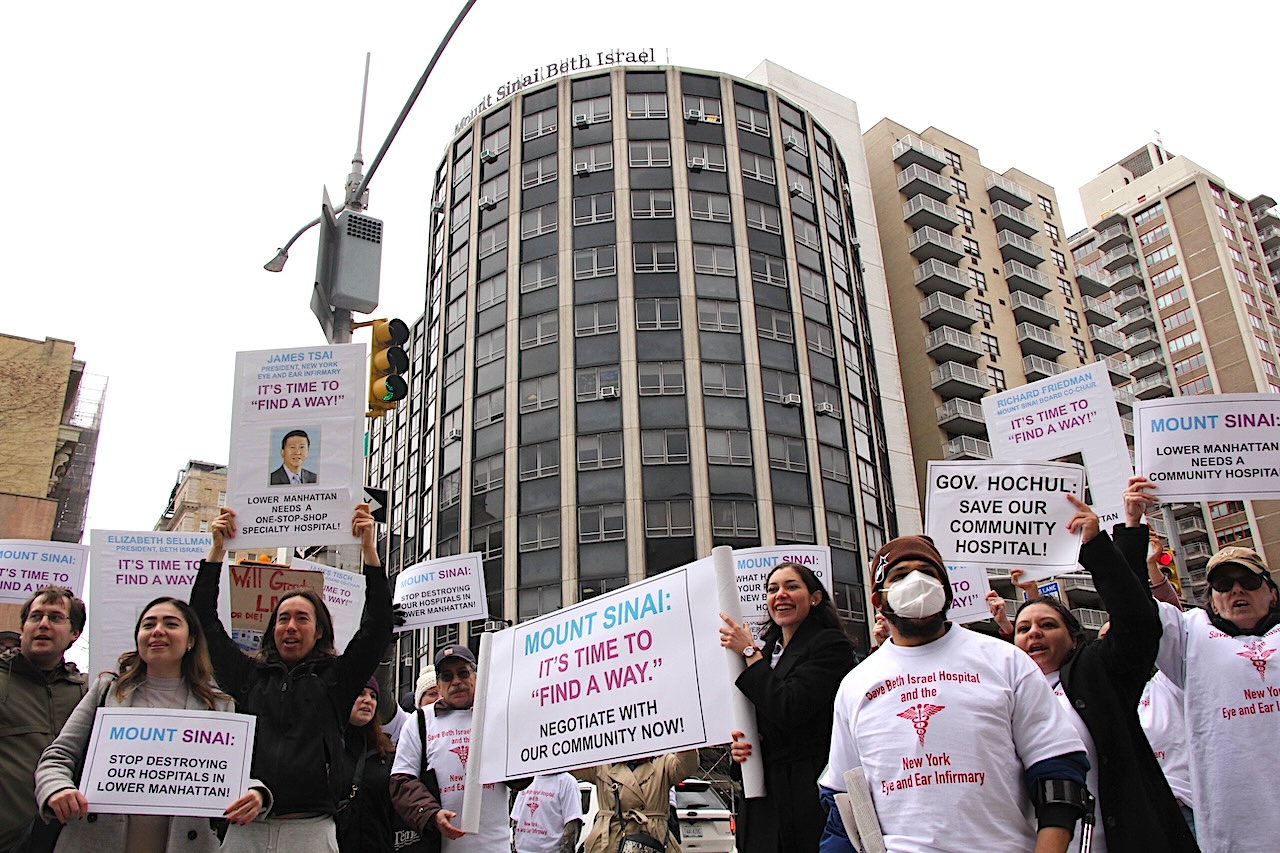
MEANWHILE, the UES is also pissed off. IT’S INSANITY.
NYC hospital-building boom on Upper East Side roils …
New York Post
https://nypost.com › 2024/05/16 › business › nyc-hospi…
4 days ago — New leases and expansions for health facilities in Manhattan totaled nearly 5.4 million square feet since 2018, much of it concentrated north of …
NYC hospital-building boom on Upper East Side roils …
AOL.com
https://www.aol.com › nyc-hospital-building-boom-upp…
New leases and expansions for health facilities in Manhattan totaled nearly 5.4 million square feet since 2018, much of it concentrated north of 59th Street on …
Upper East Side Faces Growing Pains with Surge in …
The Jewish Voice
https://thejewishvoice.com › 2024/05 › upper-east-side-…
3 days ago — Residents are also voicing concerns about temporary nuisances caused by ongoing construction. The report in the Post said that complaints range …
This story embodies one of the many overwhelming ways healthcare in the whole country is being undermined, and in some cases, destroyed. As a former East Villager, I was helped through some grave crises by Beth Israel. I am heartened that this may end up the right way. Thank you for this reporting — we must all be made aware of the direness of our circumstances.
I wonder whether Beth Israel’s aborted attempt to purchase the 14th Street Y in 1989 — having handed over $1 million under the table — was actually a real estate grab for the future. BI settled for Zeckendorf Towers when the price was right. These not-for-profit operators are not different than private equity that acquires, drains and discards medical groups — depriving the public of vital medical care.
Mt. Sinai bought Beth Israel, closed Beth Israel North (formerly Doctors Hospital), sold it, a luxury apartment building now stands there.
Now they want to do the same (sell it so it can become a luxury high-rise) to the original Beth Israel itself. When Mt. Sinai management bought Beth Israel, was that to expand its network of hospitals, or was it a pure real estate play for someone?
Given that I am a congenital heart patient who has developed sarcoidosis post-9/11, I was shocked to learn this week that Beth Israel had closed both of these specialties. And on my last visit to NYU emergency, I waited 9 hours.
I’ve also lived through 9/11, Superstorm Sandy, Covid and several power outages.
The lives of 400,000 people living below 14th St. will be jeopardized by this closing. The Eye and Ear Hospital provided me with the best eye doctor ever, who did my parents’ cataract surgeries, and later my Lasik and cataract surgery. Beth Israel also performed a quintuple bypass on an elderly friend, along with inpatient rehab.
This is an example of the worst kind of corporate greed. The inequities of congestion pricing won’t matter if our city pursues the rich to build the tax base at the cost of health for those who built the City. And the idea that they consulted the Community and local politicians is a joke.
PS, It occurs to me that I left out living through the tragedy of the AIDS era and at the time there were more beds because of a system of Catholic hospitals. (Think Cabrini, St Claire’s and St Vincent’s, etc.) Still, patients lying on gurneys lining the corridors for days at a time abounded.
A healthcare crisis, if there ever was. Even the threat of Ebola didn’t stop and make people think.
We successfully put off the attempt to create a food desert in our area by closing Morton Williams. Who would imagine we are once again being deserted by the powers and perhaps heading for a healthcare desert instead.